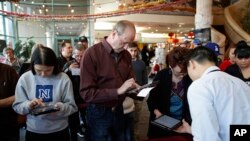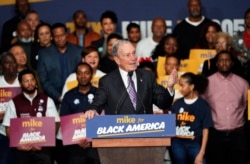Voters in the western U.S. state of Nevada are casting early ballots in the next Democratic Party nominating contest, the third in a long string of state caucuses and party primary elections to pick a candidate to oppose Republican President Donald Trump in November's national election.
This is this first time such early voting has been allowed in Nevada and its popularity fueled long lines on the first day of voting Sunday, with some waiting up to 90 minute to make their selections from among a crowded group of Democratic candidates.
Early voting runs through Tuesday, with the bulk of voting set to take place at caucuses held Saturday throughout the state.
Nevada is the first place where the Democratic contenders are facing a racially diverse electorate. Hispanic and African-American voters comprise a large part of the Nevada population, unlike the predominantly white states of Iowa and New Hampshire where the first votes were cast in the last two weeks.
Pre-election polls show that Vermont Sen. Bernie Sanders, a self-declared democratic socialist who won the popular vote in both Iowa and New Hampshire, could also win in Nevada, home to the country's gambling mecca in Las Vegas.
Sanders was locked in tight vote counts with former South Bend, Indiana Mayor Pete Buttigieg in both of the first two states, but the political surveys show former Vice President Joe Biden could be his main challenger in Nevada. Biden, once the favorite in national polls to take on Trump, is seeking to regain his political footing after finishing fourth in Iowa and fifth in New Hampshire.
Minnesota Sen. Amy Klobuchar and Massachusetts Sen. Elizabeth Warren, who finished third and fourth, respectively, in New Hampshire, are also looking to gain new strength in the Nevada voting ahead of a primary election in the southern state of South Carolina on Feb. 29.
The five candidates have had the field to themselves in the early contests. But come March 3, dubbed Super Tuesday with voting in 14 states, they will face a new challenger, former New York Mayor Michael Bloomberg.
Bloomberg, by his own choice, has skipped the voting in the first four states. But he has spent nearly $400 million of his own money on an array of television ads and hiring campaign workers throughout the Super Tuesday states and in states voting later in the Democratic chase for the presidential nomination.
Bloomberg's ascent in national presidential polling has drawn the attention of Trump, who has disparaged his candidacy. Bloomberg's rise has also drawn new scrutiny to his tenure as mayor of the country's largest city from 2002 to 2013 and his ownership of his eponymous business information company that made him a billionaire.
Bloomberg has apologized for a "stop-and-frisk" policy he implemented on the streets of New York, an effort to curb crime, that he now acknowledges inordinately targeted minorities.
The Washington Post on Saturday published a withering account of the 78-year-old Bloomberg's life as a corporate chieftain, detailing countless profane, sexist and misogynistic comments targeting women who worked at his company, many of them in the years before he entered New York City politics.
In response, a campaign spokesman said Bloomberg "simply does not tolerate any kind of discrimination or harassment, and he's created cultures that are all about equality and inclusion."





